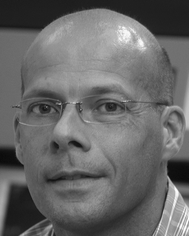Alternative fuel technologies
Dirk M. Guldi
 Dirk M. Guldi Dirk M. Guldi | Dirk M. Guldi graduated from the University of Cologne (Germany) in 1988, from where he received his PhD in 1990. In 1992, after a postdoctoral appointment at the National Institute of Standards and Technology, he took a research position at the Hahn-Meitner-Institute, Berlin. After a brief stay as a Feodor-Lynen Stipend (Alexander von Humboldt Foundation) at Syracuse University, he joined the faculty of the Notre Dame Radiation Laboratory in 1995, where he was promoted to Associate Scientist in 1996. In 1999 he completed his Habilitation at the University of Leipzig (Germany). Since 2004 he has been a chaired Full Professor at the Friedrich-Alexander University in Erlangen (Germany). He was awarded the Heisenberg Prize (1999; Deutsche Forschungsgemeinschaft), Grammaticakis-Neumann Prize (2000; Swiss Society for Photochemistry and Photophysics), JSPS Fellowship (2003; The Japan Society for the Promotion of Science) and JPP Award (2004; Society of Porphyrins and Phthalocyanines). |
The world’s population is consuming the remaining fossil fuels at a rapid and accelerating rate, and is likely to face serious energy shortages in the near future. High energy consumption and the ever-increasing global population are forcing us to confront the critical problems of dwindling fossil energy supplies and global climate change.
Coal, oil, gas, nuclear, and other mined fuels currently provide most of the global energy needs. Despite the rapid expansion of their role in the energy sectors of developing and industrialized economies, modern renewable energy technologies account for less than 5% of the energy mix of the global power sector capacity. Renewable energy technologies that have the potential to provide future energy supplies include biomass systems, hydroelectric systems, hydrogen fuel, wind power, photovoltaics, solar thermal systems, and passive and active heating and cooling systems. They typically produce lower or no air emissions, little or no solid wastes, and less land disruption when compared to coal, natural gas or nuclear power plants.
A further question of paramount significance is the storage of energy as well as its efficient conversion. In this context, electrochemical devices such as fuel cells and batteries are to the fore. It is to be anticipated that electrochemistry will play a decisive role in the future with respect to energy technology not dissimilar to the role of electronics for information technology.
Widespread adoption of new technologies is constrained by a multitude of policy, regulatory and financial barriers and gaps. Relating to all these factors is the fundamental scientific research on alternative fuel technologies, which leads to new cost-effective technological solutions that can change our lives and improve our world. With all these factors in mind, I, along with my fellow Guest Editors Adriano Zecchina (Torino) and Joachim Maier (Stuttgart), am proud to present this the first issue in a PCCP themed series on Alternative Fuel Technologies.
The aim of the series is be a timely showcase for the latest cutting edge international research in this most important of multidisciplinary fields, and to show how the latest physical chemistry research can lead a path to ground-breaking new energy technologies.
The articles in this issue, along with all of the other themed issue articles, are collected together on a single webpage—http://www.rsc.org/pccp/altfuel—for ease of browsing. New articles are being added to this page as soon as they are published online as Advance Articles. Please do take the time to visit the webpage and read some of the exciting research. More print themed issues will appear over the coming weeks.
In my own field, worldwide action programs contribute to the implementation of renewable energy as a sustainable and long-term energy supply, by undertaking new science and technology developments to ensure the quality of 1st and 2nd generation photovoltaic technology, that is, Crystalline Silicon and Thin Films, respectively, and to develop 3rd generation photovoltaic technology. With this in mind, a highlight of recent research on nanometer scale carbon structures for photovoltaic applications can be found in my Invited Article in this issue (DOI: 10.1039/b617684b).
Production of primary energy from renewable sources is expected to grow rapidly over the next two decades. There are significant challenges for mankind in the years and decades to come relating to the production and storage of energy, and I hope that some of the articles in this themed series will help to address these challenges. To ensure a reasonable standard of living in the future, there must be a fair balance between human population density and energy, land, water, and biological resources.
I very much hope you enjoy the range of articles from the international groups who have contributed to this PCCP series of special issues on Alternative Fuel Technologies.
| This journal is © the Owner Societies 2007 |
